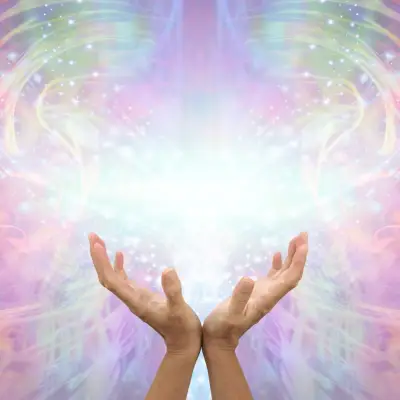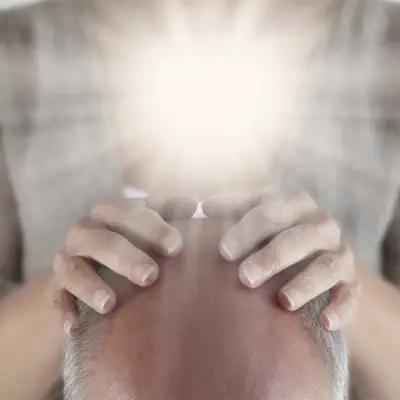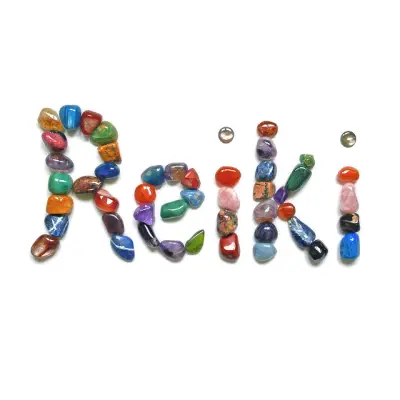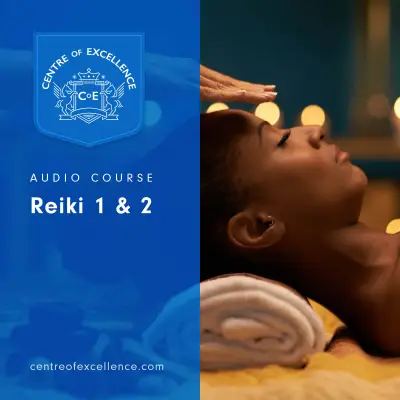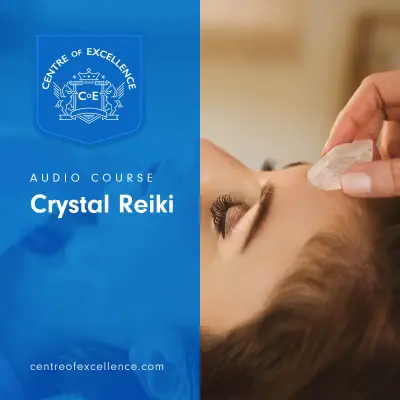Are you curious about Reiki and how it can help you? Maybe you've come across it in your wellness research, or perhaps you’re considering it as a career. If you're looking to understand this intriguing practice, you're in the right place. This blog post breaks down everything you need to know about Reiki, including its benefits and what to expect from a session.
Jump to:
What is Reiki?
Reiki is a form of energy healing that originated in Japan. The word Reiki is derived from two Japanese words: 'Rei,' meaning universal, and 'Ki,' meaning life energy. So, Reiki translates to 'universal life energy.' This practice involves the transfer of energy from the practitioner's hands to the patient to promote physical and emotional healing.
Recommended for you!
Best SellersHow Does Reiki Work?
Reiki works on the principle that life force energy flows through us and is what keeps us alive. When this energy is low, we are more likely to get sick or feel stressed. When it is high, we are more capable of being happy and healthy. Reiki practitioners believe that by channelling this energy, they can help balance and heal the body's energy fields.
What is Reiki Used For?
Reiki is used for a variety of purposes. It can be a complementary therapy alongside conventional medical treatments or a standalone practice for personal wellbeing. People use Reiki to:
Reiki Sessions: What to Expect
If you're considering trying Reiki for the first time, you might be wondering what actually happens during a session. Knowing what to expect can help you feel more comfortable and open to the experience. Here’s a look at the different stages of a typical Reiki session, from preparation to post-session effects.

Before the Session
Preparation is key to a successful Reiki session. Wear comfortable clothing, as you will remain fully clothed throughout the session. Before starting, you'll have a brief consultation with the practitioner to discuss your intentions or any specific areas of concern. This helps the practitioner tailor the session to your individual needs.
During the Session
Once you’re ready, you’ll lie on a massage table in a quiet, relaxing environment. Soft music or nature sounds might be playing to enhance the calming atmosphere. The practitioner will then place their hands lightly on or over specific areas of your body, following a series of standard hand positions.
A typical session lasts between 60 to 90 minutes. During this time, you might experience sensations such as warmth or heat from the practitioner's hands, tingling or pulsing feelings, or a deep sense of relaxation and calm. Some people also report feeling a gentle flow of energy or seeing colours.
After the Session
After the session, you might feel very relaxed, rejuvenated, or emotionally balanced. It’s important to drink plenty of water and rest if needed, as you may experience temporary symptoms like fatigue or emotional release while your body adjusts. These aftereffects are part of the body’s natural healing process.
Communication is encouraged throughout the session, so feel free to speak up if you need to adjust your position or have any concerns. Depending on your needs, your practitioner might suggest a follow-up session or additional practices to support your wellbeing. This ongoing support can help maintain the benefits of Reiki and promote long-term healing.
The Benefits of Reiki
Many people seek Reiki for its potential benefits, which include:
- Stress Reduction: Reiki is known for its ability to help reduce stress and promote relaxation.
- Pain Relief: Some people find relief from chronic pain through regular Reiki sessions.
- Emotional Healing: Reiki can support emotional healing, helping you process and release negative feelings.
- Improved Sleep: By promoting relaxation, Reiki may help improve sleep patterns.
- Enhanced Wellbeing: Overall, Reiki can contribute to a sense of improved wellbeing and balance.
- Increased Energy Levels: Reiki can help boost your energy levels by removing energy blockages and promoting the flow of life force energy.
- Mental Clarity: Regular Reiki sessions can improve mental clarity and focus, helping you think more clearly.
- Detoxification: Reiki aids in the body’s natural detoxification process, helping to remove toxins and impurities.
- Spiritual Growth: Reiki can enhance spiritual growth and self-awareness, connecting you more deeply with your inner self.
- Immune System Support: By reducing stress and promoting relaxation, Reiki can help support and strengthen your immune system.
- Recovery from Illness: Reiki can assist in recovery from illness or surgery by promoting faster healing and reducing side effects.
- Reduction of Anxiety and Depression: Reiki's calming effects can help reduce symptoms of anxiety and depression, contributing to better mental health.
- Balancing Chakras: Reiki can help balance the body's chakras, or energy centres, leading to overall harmony and balance.
- Support for Chronic Conditions: Reiki can be beneficial as a complementary therapy for managing chronic conditions, offering comfort and relief from symptoms.
- Pain Management: In addition to chronic pain relief, Reiki can also help with acute pain management from injuries or other sources.
- Boosting Confidence and Self-Esteem: Reiki can help improve your self-worth and confidence by clearing negative energy and promoting positive feelings.

Is Reiki Real?
You might wonder if Reiki is real or if it’s just a placebo. Scientific research on Reiki is still in its early stages, but many people report significant benefits from their sessions. The positive experiences of countless people suggest that Reiki has a genuine impact, whether through the power of touch, the transfer of energy, or the creation of a calming environment.
What Does Reiki Feel Like?
Experiences during a Reiki session can vary. Some people feel sensations such as warmth, tingling, or pulsing in the areas being treated. Others might not feel any physical sensations but experience a sense of relaxation and peace. It’s also common to see colours or have emotional releases during a session.
Are There Risks to Reiki Healing?
Reiki is generally considered safe and non-invasive. However, it should not replace conventional medical treatments. It’s important to use Reiki as a complementary therapy and consult with healthcare professionals about any medical concerns.
How Often Should You Do Reiki?
The frequency of Reiki sessions depends on your individual needs and goals. Some people benefit from weekly sessions, while others might find that monthly sessions are sufficient. It’s a personal choice and can be adjusted based on how you feel and what you’re hoping to achieve.

Frequently Asked Questions About Reiki
What Are the Disadvantages of Reiki?
While Reiki is generally considered safe, there are a few potential disadvantages to be aware of:
- Temporary Symptoms: Some people might experience temporary symptoms like fatigue, headaches, or emotional release as their body adjusts to the energy work.
- Dependency: There is a risk of becoming overly dependent on Reiki sessions, neglecting other important medical or therapeutic treatments.
- Unqualified Practitioners: It's important to ensure that you are receiving Reiki from a qualified and experienced practitioner to avoid ineffective or potentially harmful sessions.
When Should Reiki Not Be Used?
Reiki should not be used as a substitute for medical treatment for serious or life-threatening conditions. It is a complementary therapy and should be used alongside conventional medical treatments. Additionally, if you have certain medical devices implanted, such as a pacemaker, consult with your healthcare provider before receiving Reiki.
Do You Talk During Reiki?
Reiki sessions are usually conducted in silence to promote relaxation and focus. However, you can communicate with your practitioner if you need to adjust your position or if you have any concerns during the session.
Why Do I Shake During Reiki?
Shaking or twitching during a Reiki session can happen as your body releases built-up tension and energy blockages. It is a normal response and usually subsides as the session progresses.
Can I Do Reiki on Myself?
Self-Reiki is a wonderful way to maintain your energy balance and promote relaxation. Learning how to perform self-Reiki can be an empowering tool for personal wellbeing.
What can I Expect After my First Reiki Session?
After your first Reiki session, you might feel deeply relaxed, rejuvenated, or even emotional. It’s common to experience a sense of calm and clarity. Some people might have temporary symptoms like fatigue or headache as their body adjusts.
Is Reiki Just a Placebo?
While some sceptics argue that Reiki's benefits are due to the placebo effect, many people report significant improvements in their physical and emotional wellbeing that they attribute to Reiki. The relaxing and comforting nature of the practice can contribute to its effectiveness, whether or not energy transfer is scientifically proven.
Where Does Reiki Energy Come From?
Reiki practitioners believe that the energy used in Reiki comes from the universal life force that flows through all living things. This energy is channelled through the practitioner’s hands to the recipient to promote healing and balance.
Why is Reiki Not Allowed by the Catholic Church?
Some Catholic authorities do not endorse Reiki because it does not align with traditional Christian teachings and because its effectiveness has not been scientifically validated. The Church encourages its followers to seek healing through prayer and sacraments instead.
What Religion is Reiki Based On?
Reiki is not based on any specific religion. It is a spiritual practice that can be used by individuals of any faith or belief system. It focuses on the universal life force energy that is believed to be present in all living things.
Do You Keep Clothes on for Reiki?
You keep your clothes on during a Reiki session. It’s best to wear comfortable clothing to help you relax.
Why Do I Fall Asleep During Reiki?
Falling asleep during a Reiki session is common because the deep relaxation can make you feel very sleepy. It’s perfectly normal and part of the healing process.
Can You Feel Pain During Reiki?
Reiki is not typically painful. However, some people might experience temporary discomfort in areas where they have existing issues as the energy works to release blockages.
Does Reiki Help with Anxiety?
Many people find that Reiki helps reduce anxiety by promoting relaxation and creating a sense of calm.
Why Does My Head Hurt After Reiki?
A headache after a Reiki session might occur as your body releases tension and adjusts to the energy changes. It’s usually temporary and can be treated by drinking water and resting.
How Long Does It Take for Reiki to Work?
The effects of Reiki can vary from person to person. Some people feel immediate benefits, while for others, it might take a few sessions to notice significant changes.
Recommended for you!
Best SellersStudy Reiki I & II for £29
If you're interested in exploring Reiki further, why not consider enrolling in our Reiki Diploma Course? This detailed course will equip you with the knowledge and skills to practise Reiki on yourself and others. For a limited time, you can access this course for just £29, saving you over £100!

